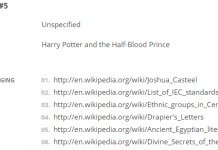 On Waxy, Andy Baio made a post called “No Copyright Intended”, in which he pointed out the confusion surrounding copyright in YouTube videos. Literally hundreds of thousands of videos have some kind of copyright disclaimer, saying that “no copyright infringement is intended.”
On Waxy, Andy Baio made a post called “No Copyright Intended”, in which he pointed out the confusion surrounding copyright in YouTube videos. Literally hundreds of thousands of videos have some kind of copyright disclaimer, saying that “no copyright infringement is intended.”
On YouTube’s support forums, there’s rampant confusion over what copyright is. People genuinely confused that their videos were blocked even with a disclosure, confused that audio was removed even though there was no "intentional copyright infringement." Some ask for the best wording of a disclaimer, not knowing that virtually all video is blocked without human intervention usingContentID.
YouTube’s tried to combat these misconceptions with its Copyright School, but it seems futile. For most people, sharing and remixing with attribution and no commercial intent is instinctually a-okay.
This isn’t a new issue. In my first TeleRead post in 2006 I brought up a survey that showed that a lot of teenagers thought it was legal to copy a CD or movie if its owner had paid for it. And these disclaimers remind me of the similar practice of sticking copyright/please-don’t-sue-me disclaimers on Internet fanfic (which is probably where the YouTube practice originated, come to think of it). And one of the commenters to the article pointed out a post by David Pogue from 2007 in which he discussed how only two people in a crowd of 500 college students indicated they felt that downloading stuff without paying for it was wrong.
Baio points out that anyone who was over age 12 when YouTube launched in 2005 is now able to vote, and these younger generations who have no problems with remix culture are getting older all the time (and, just as with schoolyard rhymes and games, handing their perspectives down to generations even younger than they). What happens as older generations die out and these younger generations make up a greater and greater proportion of the voting public—or get elected to office themselves?
Remix culture is the new Prohibition, with massive media companies as the lone voices calling for temperance. You can criminalize commonplace activities from law-abiding people, but eventually, something has to give.
Media companies are busy fighting piracy now, and brick and mortar stores are tussling for survival with e-tailers. But all this jockeying for short-term advantage leaves open the question of what will happen to copyright in the longer term—and what will become of those businesses that make their living on copyright. Perhaps they should consider how they can continue making a living when almost everyone routinely violates copyright.
(Found via Techdirt.)

































It IS legal to make a copy of a movie or cd that you buy for back up purposes, provided that you don’t distribute it or circumvent DRM why doing so. That’s within the umbrella of fair use. Here’s a link that discusses it. http://www.imaginelaw.com/lawyer-attorney-1181372.html
Copyright has a terminal case of disrepute because it has been consistently and grossly exploited by creators and the corporate world via the compliance of politicians under high pressure lobbying.
It is terminal because it now gives most ordinary people a lingering bitter taste, and no amount of lecturing from writers, creators or businesses or politicians will change that.
The law cannot and will not make people do what they do not want to do and what they feel is wrong, and technology has now given them a free choice whether they want to accept this draconian copyright system or not.
Their choice, consistent across the world, is NO THANK YOU. They don’t care about the law. They don’t care about the finger wagging. They don’t care about the patronising lecturing. They don’t care.
No amount of new legislation will change this. No amount of ‘strengthening’ of copyright will change it, no amount of stupid court action against ‘downloaders’ will change it, in fact all of this will only make it worse.
The die is cast.
Copyright’s only chance to regain ground is to reform itself to bring back common sense and to return to the original intentions of copyright.
Perhaps the “confusion” arises from the fact that the legal issues concerning remix are a bit more complex than the quoted article suggests. Here’s the Librarian of Congress becoming involved in the matter:
http://www.copyright.gov/1201/2010/
I thought I read once that remixes were permissible as long as they don’t provide a substitute for the original content. The story was about a lady who filmed her son while he was dancing to a song on the radio and then posted it on YouTube so her relatives could see the baby’s funny dance. The musician performing the song on the radio sued claiming she was infringing on the song, and then judge voted in her favour since a) the ‘sample’ of the song was so short that someone seeking to have the content would not watch the video instead of actually buying the content and b) that people were watching the video primarily to see the baby therefore the portion of the song which was used was incidental and again, not a replacement for actually purchasing the song. In other words, if it was the song you were after, watching the video would not be a replacement and therefore she was not infringing. Similarly, I think fanfic falls into this same grey area because people do not read it *instead of* watching the original media, they read it in addition. Since it cannot serve as a replacement where someone might read the fanfic instead of consuming the original content, it does not infringe. This is common sense to me and I think that over time, we will see the laws loosen back toward common sense a little where, while they will not per se endorse such uses as described above, they will not prohibit them and they will introduce a fairness test similar to the one Canada has to test for whether a use is an education fair use exception (it is a six-part test). I really don’t see even the most zealous copyright fanatic going after someone for reading a fanfic…
Fanfics are derivative works, are they not? I think that,fact combined with trademark law, forms the legal basis for their legally shady status.
Joanna wrote “The musician performing the song on the radio sued claiming she was infringing on the song”
Thus contributing to the ‘terminal case of disrepute’ that I believe has now condemned copyright to in the minds of the world’s public.
I agree with Howard about copyright’s current lack of credibility. I’m 53, and I always thought copyright was intended to protect the interests of the creators _and_ the community. That isn’t happening. Copyright is protecting most of all the secondary “industry” leaching off creation: publishers and retailers. We’ll always need creative people, and the community in general is willing to contribute to their support. What we’re not willing to do is be seriously overcharged, and blocked from accessing creative work for which we are willing to pay (geolims). We don’t see the direct benefit to creators of massive, greedy companies and vicious legislation attacking personal rights.
This issue is not about being a kid of the digital age. It’s about fair use and access.